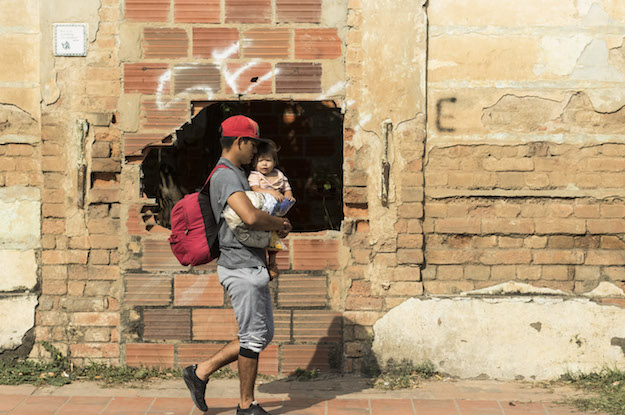The Venezuelan refugee crisis is not going to end any time soon, and efforts of governments and aid agencies to support refugees have not been sufficient to mitigate the suffering, a new poll of Venezuelans in Peru and Colombia finds. Thus, it is imperative for the business community to help fill existing gaps in services and provide long-term relief by providing refugees with legal and stable employment that capitalizes on their professional skills and training.
The poll, conducted by public opinion research firm GBAO and sponsored by the Tent Partnership for Refugees, confirms projections that the number of refugees in Colombia, Peru and elsewhere will likely rise significantly in the coming months and remain high given the misgivings that many Venezuelans harbor about their country’s prospects. More than 4 million Venezuelans have already left their country since 2014 due to the economic collapse and humanitarian crisis created by the Maduro regime’s policies, and most of the 600 refugees we surveyed through face-to-face interviews in Peru and Colombia have family members in Venezuela who plan to join them.
While most refugees say they would likely return if Maduro and his ruling Socialist Party are replaced, a significant share would wait until an economic recovery is underway, according to our poll. Still, no matter the political scenario, reviving the Venezuelan economy will take time. Petroleum exports are the mainstay of the licit Venezuelan economy, but the country’s oil infrastructure is decimated, and production has cratered to its lowest level in decades. A new government will have to rebuild state institutions, while some of the country’s most qualified professionals remain in exile.
Even if economic revival in Venezuela follows a departure of Maduro, about 20% of the poll’s respondents say they would not return at all – suggesting long-term displacement for about a million Venezuelans in even the most optimistic scenario.
Given these projections, Venezuelan refugees should not be viewed as merely a short-term or stop-gap source of labor. Rather, our poll underscores the need for international actors, including the business community, to treat the Venezuelan refugee crisis as a long-term challenge.
Refugees’ needs are many, but businesses can be most helpful in the following areas:
- Hiring: Most refugees interviewed for our study are employed, but many work informally and most earn a meager income. Instead, businesses could help Venezuelan refugees fill positions for which qualified local candidates are harder to find. Besides being eager to find better employment, many refugees are well-educated, have professional experience and can serve in management positions; others have skills in short supply locally, such as manufacturing in Colombia and office management in Peru. Companies like Sierra Nevada, a Colombian hamburger restaurant chain that is hiring 100 Venezuelan refugees as full-time employees by 2022, are already integrating Venezuelan refugees into their workforce.
- Training and credentialing: Many refugees arrived with backgrounds in academia, business and skilled labor, but only about 1 in 6 work in the same professional field in which they were employed in Venezuela. Companies could help refugees to re-credential, take steps to better identify and harness useful skills and expertise, or train them to upgrade their skills.
- Small-business support: About half of Venezuelan refugees in Colombia are running their own business — often because employment opportunities are foreclosed. Companies have an opportunity to provide training, help with marketing and outreach, and source goods and services from them. For example, Accenture is funding a skill-development program for Venezuelan refugees in the north of Brazil to help them start their own businesses or find other employment opportunities.
- Banking: Only about 30% of the Venezuelans surveyed have a bank account, limiting their ability to save or access credit. Providing financial products and services such as digital bank accounts or mobile banking – most refugees already have regular internet access – would help refugees establish financial stability. For example, Ualá, an Argentine financial technology company, is working to provide mobile financial accounts to 100,000 Venezuelan refugees in Latin American markets by 2021.
- Combating xenophobia: Most Venezuelan refugees report incidences of discrimination, which they attribute to their status as migrants. Severe demands placed on communities around sites of significant migration may be responsible for this mistreatment, which highlights a larger point: Many Colombians and Peruvians are disadvantaged themselves. Programs designed to support both refugees and their host communities could ease the discrimination many refugees experience.
Companies in Latin America are coming to appreciate that refugees should not be seen as victims, but as economically productive workers, suppliers, entrepreneurs and customers. Businesses that hire Venezuelan refugees, integrate them into supply chains and deliver services to them can enhance their own operations as they respond to one of the defining challenges of our time.
—
Feierstein is senior advisor at GBAO, a public opinion research firm. Maltz is executive director of the Tent Partnership for Refugees.







